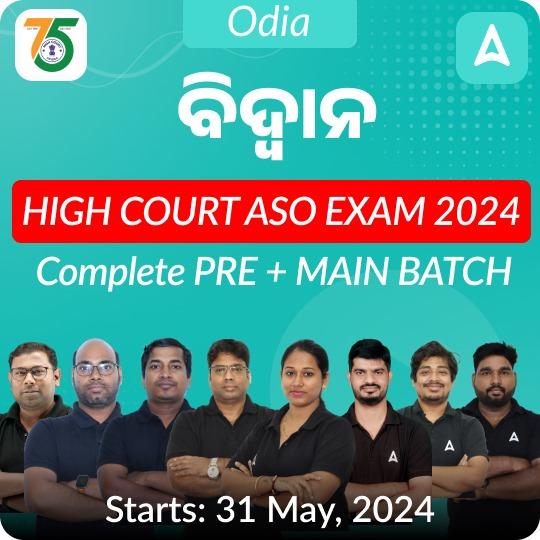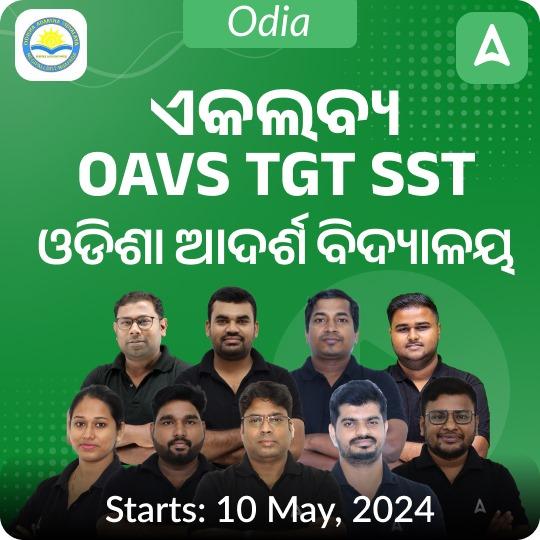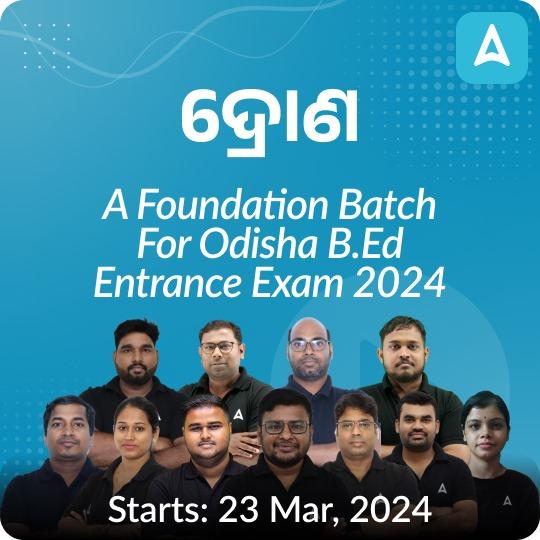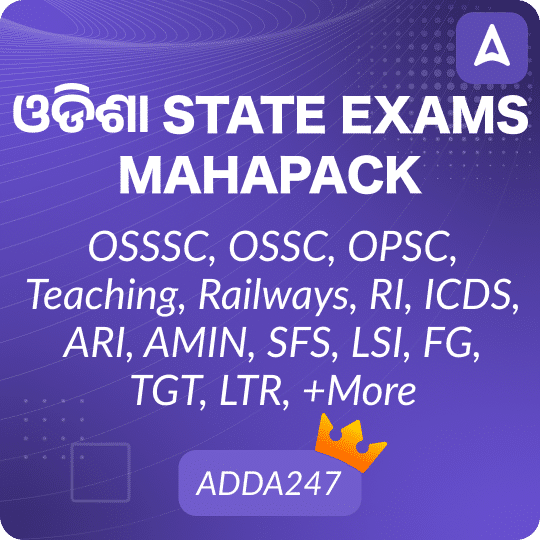English MCQs and Answers: English MCQs are essential for OPSC, OSSC, OSSSC & Other State Exams. Aspirants willing to apply for the various Government exams in 2022 must go through the topics of general English for competitive exams, as the English language is a key part of the syllabus.
Download ADDA247 Odia APP – Appear Latest Exam Test Series & Live Classes
Q1. Given below are four jumbled sentences. Pick the option that gives the correct order.
- The autobiography was written as a weeklyjournal and then compiled and published as a book.
- The introduction mentions how Gandhi resumed writing at the insistence of a fellow prisoner at Yerwada Central jail.
- If you want to know all about Gandhi and his journey, you cannot miss out on reading ‘My Experiments with the Truth’, his autobiography that covers his life from early childhood till 1921.
- From his childhood memories, his experiments with eating meat, smoking, drinking and stealing to the demise of his father, the book captures many unknown instances of Gandhi’s life.
(a) RQPS
(b) SRQP
(c) QPSR
(d) PQSR
S1. Ans (a)
Sol. The correct answer is option a.
The proper sequence is – RQPS
Q2. Given below are four jumbled sentences. Pick the option that gives the correct order.
(S) National Geophysical Research Institute (NGRI), Hyderabad, failed to detect any bodies buried under the massive debris.
(P) The ground penetrating radar (GPR) equipment brought by a team from the.
(Q) Human experience and dedication won where the machine failed.
(R) The men of the Kerala Fire and Rescue Services retrieved six more bodies from the landslip-ravaged Kavalappara, near Nilambur in Malappuram.
(a) QRPS
(b) PSRQ
(c) PRSQ
(d) QRSP
S2. Ans.(a)
Q3. Given below are four jumbled sentences. Pick the option that gives the correct order.
- But to prospective brides and their families, Pawar was not eligible enough: he did not have a stable, well-paying job that could support a family.
- From 1999 to 2004, Deepak Pawar faced a string of rejections from the arranged marriage market.
- He was a tall, lean man in his early twenties, with high cheekbones and deep-set eyes.
- In the suburban Mumbai slum where he lived, most men his age had already tied the knot.
(a)RQPS
(b)SPQR
(c)QRSP
(d)PQSR
S3. Ans (c)
Sol. The correct answer is option c.
The proper sequence is- QRSP
Q4. Select the word which means the same as the group of words given.
Someone who has experience of many different parts of the world.
(a) Bohemian
(b) Cosmopolitan
(c) Philanthropist
(d) Chauvinist
S4. Ans (b)
Sol. The correct answer is option b.
Cosmopolitan – Someone who has experience of many different parts of the world.
Whereas, meaning of other words –
Bohemian- a socially unconventional person, especially one who is involved in the arts.
Philanthropist – a person who seeks to promote the welfare of others, especially by the generous donation of money to good causes.
Chauvinist – A person who is blindly devoted to an idea/ a person displaying aggressive or exaggerated patriotism.
Option (b) portrays the same meaning as that of the given group of words & hence it is the correct choice.
Q5. Select the most appropriate idiom (in the context) to fill in the sentence.
Mayank was _______________ in debt.
(a) Over head and ears
(b) All ears
(c) A storm in a teacup
(d) Head over heels
S5. Ans (a)
Sol. The correct answer is option a.
Over head and ears – It is an idiomatic expression which means, ‘deeply; Completely trapped.
As per the context, the idiom – ‘Over head and ears’ best fits in the given sentence.
Hence, option (a) is the correct choice.
Directions (6-10): Read the following passage and answer the questions given after it.
We often worry about lying awake in the middle of the night – but it could be good for you. A growing body of evidence from both science and history suggests that the eight-hour sleep may be unnatural.
In the early 1990s, psychiatrist Thomas Wehr conducted an experiment in which a group of people were plunged into darkness for 14 hours every day for a month. It took some time for their sleep to regulate but by the fourth week the subjects had settled into a very distinct sleeping pattern. They slept first for four hours, then woke for one or two hours before falling into a second four-hour sleep. Though sleep scientists were impressed by the study, among the general public the idea that we must sleep for eight consecutive hours persists.
In 2001, historian Roger Ekirch of Virginia Tech published a seminal paper, drawn from 16 years of research, revealing a wealth of historical evidence that humans used to sleep in two distinct chunks. Roger Ekirch says a 1595 engraving by Jan Saenredam is evidence of activity at night. His book At Day’s Close: Night in Times Past, published four years later, unearths more than 500 references to a segmented sleeping pattern – in diaries, court records, medical books and literature, from Homer’s Odyssey to an anthropological account of modern tribes in Nigeria.
Much like the experience of Wehr’s subjects, these references describe a first sleep which began about two hours after dusk, followed by waking period of one or two hours and then a second sleep. “It’s not just the number of references – it is the way they refer to it, as if it was common knowledge”, Ekirch says. During this waking period people were quit active. They often got up, went to the toilet or smoked tobacco and some even visited neighbors. Most people stayed in bed, read, wrote and often prayed. Countless prayer manuals from the late 15th century offered special prayers for the hours in between sleeps. Ekirch found that references to the first and second sleep started to disappear during the late 17th Century. This started among the urban upper classes in northern Europe and over the course of the next 200 years filtered down to the rest of Western society. By the 1920s the idea of a first and second sleep had receded entirely from our social consciousness. He attributes the initial shift to improvements in street lighting, domestic lighting and a surge in coffee houses – which were sometimes open all night. As the night became a place for legitimate activity and as that activity increased, the length of time people could dedicate to rest dwindled.
Q6. The above passage _________ that an eight-hour sleep is natural.
(a) confirms the myth
(b) elaborates the myth
(c) promotes the myth
(d) examines the myth
S6. Ans(d)
Sol. The paragraph talks about all the experiment done on sleep. They examine the myth whether eight-hour sleep is natural or unnatural.
Q7. What did the experiment conducted by Thomas Wehr prove?
(a) It brought into question that sleeping for four consecutive hours is necessary.
(b) It proved sleeping for eight consecutive hours is not a norm.
(c) It established that when the nights are longer, people slept in two distinct chunks.
(d) It proved that all people slept in two distinct chunks of four hours.
S7. Ans(b)
Sol. Refer to “Thomas Wehr conducted an experiment in which a group of people were plunged into darkness for 14 hours every day for a month. It took some time for their sleep to regulate but by the fourth week the subjects had settled into a very distinct sleeping pattern. They slept first for four hours, then woke for one or two hours before falling into a second four-hour sleep.”
Q8. Roger Ekirch indicated that _________.
(a) sleeping for eight consecutive hours is a modern standard for sleep.
(b) a segmented sleeping pattern was an established common habit in nations with long winters.
(c) a segmented sleeping pattern was a historically established common old habit.
(d) the practice of sleeping for eight consecutive hours was popularized by epics
S8. Ans(c)
Sol. Refer to “Much like the experience of Wehr’s subjects, these references describe a first sleep which began about two hours after dusk, followed by waking period of one or two hours and then a second sleep. “It’s not just the number of references – it is the way they refer to it, as if it was common knowledge”, Ekirch says.”
Q9. Which of the following options is NOT true with reference to the segmented sleeping pattern?
(a) People were physically active.
(b) People were socially active.
(c) People prayed actively.
(d) People visited all-night coffee shops.
S9. Ans(d)
Sol. Refer to “During this waking period people were quit active. They often got up, went to the toilet or smoked tobacco and some even visited neighbors. Most people stayed in bed, read, wrote and often prayed.” Nowhere is it mentioned that people visited all-night coffee shops.
Q10. What caused the idea of a first and second sleep to entirely recede from our social consciousness?
(a) Industrialization and introduction of night shifts
(b) All-night coffee shops
(c) A group of rich people defying sleep
(d) An active night life facilitated by artificial lighting
S10. Ans(d)
Sol. Refer to “By the 1920s the idea of a first and second sleep had receded entirely from our social consciousness. He attributes the initial shift to improvements in street lighting, domestic lighting and a surge in coffee houses – which were sometimes open all night.”

Directions (11-13):Select the synonym of the given words.
Q11. Salubrious
(a) provoking
(b) pleasant
(c) ridiculous
(d) thanking
S11. Ans.(b)
Sol. Salubrious means health-giving; healthy. Hence option B is correct.
Q12. Desolated
(a) deserted
(b) joyful
(c) strong
(d) annoyed
S12. Ans.(a)
Sol. Desolated means extremely sad and alone or empty.
Deserted means abandoned and lonely.
Hence option A is correct.
Q13. Condone
(a) regard
(b) punish
(c) aware of
(d) overlook
S13. Ans.(d)
Sol. Condone means approve or sanction (something), especially with reluctance. So overlook is the synonym.
Directions (14-15): Identify the best way to improve the bold part of the given sentence. If there is no improvement required, select ‘no improvement’.
Q14. The police acted quickly and managed to head toward the protest of the farmers.
(a) Heading for
(b) No improvement
(c) Head off
(d) Heads up
S14. Ans (c)
Sol. The correct answer is option c.
Replace ‘head toward’ with ‘Head off’ to make the sentence grammatically and contextually correct.
Head off – to prevent something from taking place
Heading for – to be likely to experience something bad
Head toward – to progress toward a particular outcome.
Head up – a warning that something is going to happen, usually so that you can prepare for it.
Q15. UK government looking round revamp its approach for counter-terrorism programme.
(a) Looking up to
(b) No improvement
(c) Look upon
(d) Looking to
S15. Ans (d)
Sol. The correct answer is option d.
Replace ‘Looking round’ with ‘Looking to’ to make the sentence grammatically and contextually correct.
Look to something – to consider something and think about how to make it better
For example- We need to look at ways of improving our marketing.
Look up to – Show respect or admiration for.
Look upon – Gaze at something; to look on.
Look round- Search a place.
History MCQs and Answers For Odisha Exam
Reasoning MCQs and Answers For Odisha Exam














